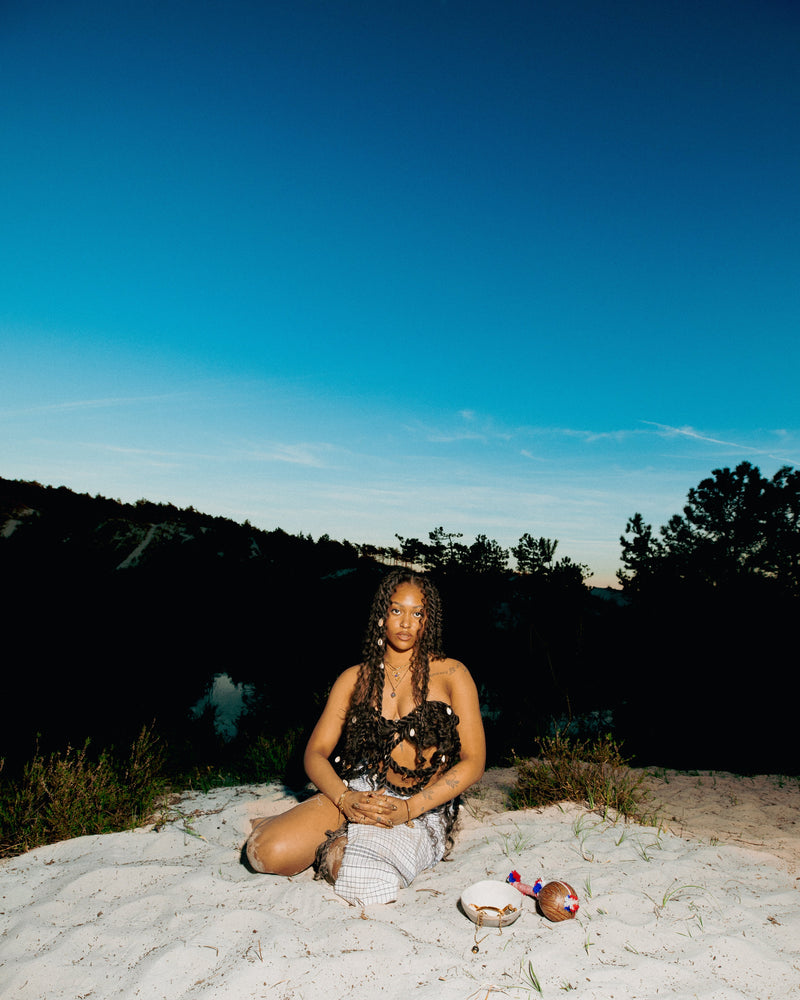
Patta Selects: Latoya Molly
Patta Selects: Latoya Molly
Words by Chris Danforth | Photography by Megan Jane SimonsLatoya Molly is the Dutch-Surinamese creative behind Geminis, a tooth gem business rooted in style, symbolism, and Surinamese heritage. Drawing inspiration from her late mother, her sisters, and her ancestry, she has transformed a niche beauty trend into a form of self-expression. Through styling, storytelling, and symbolism, especially with traditional Surinamese symbols like the pangi and the Mattenklopper, Molly invites a deeper conversation about identity, healing, and cultural pride. Geminis is a story of resilience, beauty, and the power of reclaiming one’s narrative, one gem at a time.Do you remember the first time tooth art caught your attention? What was happening in your life around the time you founded Geminis? I don’t remember a specific person with tooth gems catching my eye. But back in 2022, the hype around tooth gems was really big. At the time, I was working two jobs and going to school. One of the jobs that I still work is at the Patta store.My mom passed away in March 2022, leaving behind my older sister, me, and our three younger sisters. My sister and I took custody of them.For the first couple of months, I felt numb and in denial, so I was still able to manage work and help take care of our sisters. But eventually, the grief caught up with me, and the lack of structure became too much. One day, I came across a mini Snapchat series about a woman getting her tooth gems done in LA. It wasn’t really popular yet in her city, Atlanta, and that’s how she started. That made me realize how popular tooth gems were in Rotterdam, but there weren’t many people doing it in Amsterdam. That’s when I saw a gap in the market. I didn’t have much to lose, so I went for it. Fortunately, it worked out. “Geminis” is inspired by my astrological sign and the work I do with gems. It’s a blend of identity and craft.How do you incorporate Surinamese culture into your designs?I make sure Surinamese elements are present in every shoot. Beyond the work itself, I’m intentional with everything I organize, especially the locations. My first “big” shoot was in a Surinamese jewelry store. My second was in a Surinamese shop filled with cultural essentials.I also incorporate pangi in my styling. They’ve been worn as tops, skirts, shoulder cloths, or simply used as backdrops in past shoots. A pangi is a traditional Surinamese shawl—a long rectangular cloth worn around the waist, often reaching above the navel by women of the Maroon communities in Suriname.Jewelry is another important element for me. To me, it’s the finishing touch that brings everything together.Can you tell us about the symbolism of the Mattenklopper (carpet beater) and how you portray it in your art?Surinamese people disagree about what the carpet beater symbolizes, due to Suriname’s colonial history. Although it has West African roots, many associate it with the suffering our ancestors endured under Dutch colonial rule.Thankfully, many still embrace the carpet beater as a cultural and spiritual symbol, and that’s what I aim to express in my work. It represents values like purification, dusting away negativity, creating a clean path forward, friendship, respect, and necessity. When gifted out of love, it shouldn’t be passed on, because of those values. Some people wear it simply because they like it, but others wear it to honor the pain of our ancestors.Spiritually, the carpet beater can be seen as a Fanowdu—an essential item to integrate into your life.As an entrepreneur, where do your motivation and inspiration come from? How do you define success?My motivation comes from my sisters. They keep me going every day. My inspiration comes from our culture and from my sister, too. She’s the strongest person I’ve ever known besides our mom. She works in accounting, the complete opposite of me, but the way she takes on challenges is something I really admire and learn from.I define success as happiness and tranquility. I’ve always been a bit chaotic, and after my mom’s passing, that only intensified. I used to define success by how much money I wanted to make, but I’ve realized none of that matters if you’re not at peace or truly happy. And happiness isn’t something external; it has to come from within.
